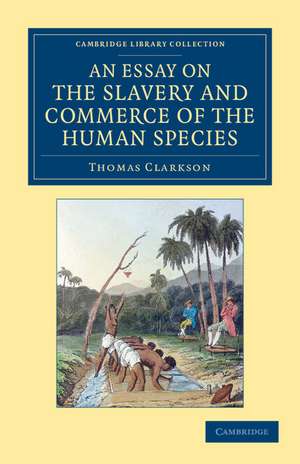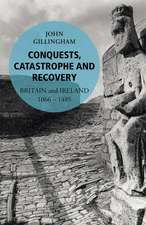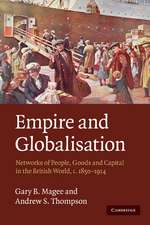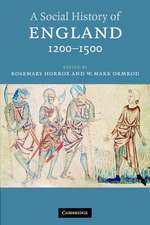An Essay on the Slavery and Commerce of the Human Species: Particularly the African, Translated from a Latin Dissertation, Which Was Honoured with the First Prize in the University of Cambridge, for the Year 1785: Cambridge Library Collection - Slavery and Abolition
Autor Thomas Clarkson, John Newtonen Limba Engleză Paperback – 5 iun 2013
Din seria Cambridge Library Collection - Slavery and Abolition
- 23%
 Preț: 799.30 lei
Preț: 799.30 lei -
 Preț: 229.29 lei
Preț: 229.29 lei - 23%
 Preț: 1587.66 lei
Preț: 1587.66 lei -
 Preț: 186.35 lei
Preț: 186.35 lei -
 Preț: 472.75 lei
Preț: 472.75 lei -
 Preț: 466.53 lei
Preț: 466.53 lei -
 Preț: 240.68 lei
Preț: 240.68 lei -
 Preț: 243.06 lei
Preț: 243.06 lei - 19%
 Preț: 471.52 lei
Preț: 471.52 lei -
 Preț: 366.37 lei
Preț: 366.37 lei -
 Preț: 370.82 lei
Preț: 370.82 lei -
 Preț: 465.38 lei
Preț: 465.38 lei -
 Preț: 421.04 lei
Preț: 421.04 lei -
 Preț: 465.60 lei
Preț: 465.60 lei -
 Preț: 285.56 lei
Preț: 285.56 lei -
 Preț: 280.56 lei
Preț: 280.56 lei -
 Preț: 375.31 lei
Preț: 375.31 lei -
 Preț: 382.62 lei
Preț: 382.62 lei -
 Preț: 467.12 lei
Preț: 467.12 lei -
 Preț: 421.42 lei
Preț: 421.42 lei -
 Preț: 278.99 lei
Preț: 278.99 lei -
 Preț: 370.82 lei
Preț: 370.82 lei -
 Preț: 422.55 lei
Preț: 422.55 lei -
 Preț: 239.75 lei
Preț: 239.75 lei -
 Preț: 466.36 lei
Preț: 466.36 lei -
 Preț: 466.36 lei
Preț: 466.36 lei -
 Preț: 370.98 lei
Preț: 370.98 lei - 19%
 Preț: 494.52 lei
Preț: 494.52 lei -
 Preț: 242.80 lei
Preț: 242.80 lei -
 Preț: 237.04 lei
Preț: 237.04 lei -
 Preț: 445.11 lei
Preț: 445.11 lei -
 Preț: 316.14 lei
Preț: 316.14 lei -
 Preț: 239.75 lei
Preț: 239.75 lei -
 Preț: 237.25 lei
Preț: 237.25 lei -
 Preț: 236.05 lei
Preț: 236.05 lei - 19%
 Preț: 456.72 lei
Preț: 456.72 lei - 19%
 Preț: 432.27 lei
Preț: 432.27 lei - 19%
 Preț: 454.20 lei
Preț: 454.20 lei
Preț: 366.74 lei
Nou
Puncte Express: 550
Preț estimativ în valută:
70.17€ • 73.27$ • 58.08£
70.17€ • 73.27$ • 58.08£
Carte tipărită la comandă
Livrare economică 05-19 aprilie
Preluare comenzi: 021 569.72.76
Specificații
ISBN-13: 9781108060141
ISBN-10: 1108060145
Pagini: 336
Dimensiuni: 140 x 216 x 19 mm
Greutate: 0.43 kg
Editura: Cambridge University Press
Colecția Cambridge University Press
Seria Cambridge Library Collection - Slavery and Abolition
Locul publicării:Cambridge, United Kingdom
ISBN-10: 1108060145
Pagini: 336
Dimensiuni: 140 x 216 x 19 mm
Greutate: 0.43 kg
Editura: Cambridge University Press
Colecția Cambridge University Press
Seria Cambridge Library Collection - Slavery and Abolition
Locul publicării:Cambridge, United Kingdom
Cuprins
Preface; Part I. The History of Slavery: 1. Introduction; 2. The first class of involuntary slaves; 3. The second class from piracy; 4. Their personal treatment; 5. The causes of such treatment among the ancients in general; 6. The ancient slave-trade; 7. The decline of this commerce and slavery in Europe; 8. Their revival in Africa; Part II. The African Commerce or Slave-Trade: 1. The history of mankind; 2. An account of the first governments; 3. Liberty a natural right; 4. Mankind cannot be considered as property; 5. Division of the commerce into two parts; 6. Their right with respect to convicts; 7. Their right with respects to prisoners of war; 8. Additional remarks on the two orders that were first mentioned; 9. The right of the purchasers examined; Part III. The Slavery of the Africans in the European Colonies: 1. Imaginary scene in Africa; 2. Their treatment on board; 3. The condition of their posterity in the colonies; 4. The seasoning in the colonies; 5. The contents of the two preceding chapters denied by the purchasers; 6. Three arguments refuted; 7. The argument, that the Africans are an inferior link of the chain of nature, refuted; 8. The argument, that the Africans are an inferior link of the chain of nature, refuted (cont.); 9. Other arguments of the purchasers examined; 10. The right of the purchasers over their slaves refuted; 11. Dreadful arguments against this commerce and slavery; John Newton's thoughts upon the African slave-trade.
Notă biografică
Descriere
A one-volume reissue of two important and influential texts of the British anti-slavery campaign in the late eighteenth century.














